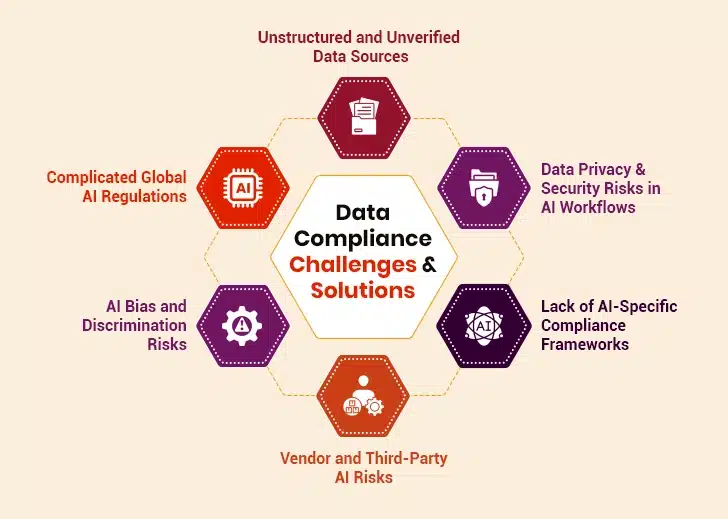Over the last few years, Gen AI has transformed many businesses, thanks to its automation, personalization, and decision-making capabilities. Be it generating reports or creating tailored marketing campaigns, Gen AI empowers you to do everything in seconds. As lucrative and exciting as it sounds, its rapid adoption brings challenges which cannot be ignored. I am specifically talking about data compliance here.
The more historical data that generative AI systems analyze, the more data privacy and security concerns we must deal with. Simply put, how responsible we are with using sensitive data. So, what happens when you use sensitive customer data without authorization? Using unapproved or private data in AI models might result in legal penalties, reputational damage, and more importantly, loss of customer trust.
On the brighter side, the global regulatory landscape seems to have tightened, with fines under GDPR exceeding €2.1 billion due to data misuse. Interestingly, research shows that every time a data breach occurs, it costs them $4.45 million per incident. The good news is that regulatory bodies are working to make sure that AI operates within ethical and legal boundaries. The onus is on businesses to craft their AI plans in a way that they fall in line with these regulations.
In this blog, I’ll cover everything that you need to know for ensuring data compliance in your generative AI strategies.
First Things First: Understanding Data Privacy Risks in Generative AI
Since generative AI uses multiple and large datasets, it’s no surprise that it presents data privacy, security, and compliance risks. If your business is using AI, you must carefully navigate these risks. It’s always better to stay away from legal issues and ethical concerns. Let’s discover the four major data privacy risks in generative AI and how they impact your business.
I. The Danger of Breaking Rules: Unauthorized Data Usage
Many AI models, like OpenAI’s GPT-4, Google’s Gemini, and Meta’s Llama, require massive amounts of data for training. In some cases, this data may include:
- Personal Identifiable Information (PII), for example names, addresses, financial records
- Proprietary business data, for example trade secrets, internal reports, customer insights
- Copyrighted content, for example articles, books, images, and music
If your company is training an AI model using this data without authorized permissions and AI guardrails, you may face strict legal and financial consequences.
Legal & Financial Risks
GDPR states that companies that process confidential data without consent can be fined either up to €20 million or 4% of their global turnover (whichever is higher). A couple years back, Meta was fined €1.2 billion. They had violated GDPR rules due to illegal transfer of data to the U.S.
Copyright lawsuits are also increasing. Several AI companies have been sued by authors, artists, and media organizations for using their content without consent.
Reputational Risks
Customers and stakeholders expect transparency and accountability in data usage. Any breach of trust might result in lost business and negative brand damage. Hence, you must ensure that your AI models only use data obtained ethically and legally. This also means proper implementation of data governance frameworks to mitigate risks.
Discover the Impact of Gen AI on Transforming Customer Experiences
II. Data Breaches and AI-Generated Privacy Violations
AI apps process massive data, that too in real time. This increases the chances of cyberattacks. Let’s understand this in detail.
Key Privacy Risks
- AI Hallucinations & Misuse: AI models may generate false or misleading information related to sensitive customer or corporate data.
- Uncontrolled AI Access: AI apps may store and analyze user interactions. This means a potential window of security vulnerabilities if proper access controls aren’t enforced.
- Third-Party AI Risks: Many companies use external AI vendors without fully understanding how these vendors handle sensitive data. This increases exposure to privacy violations.
Here’s what you can do to prevent AI-related data breaches:
- Encrypt sensitive data before feeding it into AI models
- Implement strict access controls to limit who can use AI-generated data
- Regularly monitor AI interactions to detect potential misuse
By using these privacy-first practices, you can minimize data breach risks while ensuring compliance.
III. Matching AI with Compliance Frameworks
Global AI governing laws and compliance frameworks are changing frequently. Business leaders and CTOs must keep up to date with these changes. You should develop your Gen AI models with adherence to regional and international regulations to avoid any legal risks.
Major AI & Data Compliance Laws
- General Data Protection Regulation (GDPR) (Europe): You need to make sure that:
- a. AI-generated decisions are explainable
- b. and data usage is transparent.
- California Consumer Privacy Act (CCPA) (U.S.) Customers should be able to opt out of AI data processing.
What Happens When You Don’t Comply with These?
- Financial Penalties: AI-related violations can result in millions in fines. For instance, GDPR can fine you for improper AI data handling.
- Legal Disputes: AI companies are increasingly facing lawsuits over data misuse and copyright violations.
- Loss of Consumer Trust: You’ll lose customers if your business fails to secure their data.
Here’s what you can do to stay compliant:
- Establish a dedicated AI compliance team to monitor AI-related risks
- Conduct regular audits to ensure AI models follow privacy laws
- Update AI policies in line with evolving global regulations
With this, you’ll be able to build a trustworthy AI ecosystem.
Now, let’s look at the data compliance challenges.
What Are the Challenges in Ensuring Data Compliance (And What You Can Do)
So, what are the common pain points that hold your back from embedding compliance into your generative AI strategies? Let’s find out.
1. Unstructured and Unverified Data Sources
Not all data sources are structured, verified, or legally compliant. Many AI models pull content from the internet including:
- Confidential user data from public forums or social media
- Copyrighted material (text, images, and videos) used without consent
- Outdated or biased datasets that impact AI decision-making
Using such data can lead to GDPR, CCPA, and copyright violations meaning hefty legal penalties and negative impact on brand reputation.
Here’s what you can do:
- Implement data governance frameworks to carefully evaluate AI training data
- Use sample data instead of real personal data
- Make sure AI training data complies with global privacy laws
2. Complicated Global AI Regulations
Different regions or countries have different AI laws and compliance requirements. Sometimes it’s difficult for organizations (especially MNCs) to follow these. If your business operates in multiple geographies, you must continuously update your AI policies.
Here’s how you can do this easily:
- Put together a dedicated AI compliance team
- Implement automated compliance tracking tools
- Use regionalized AI models that comply with specific legal frameworks
3. AI Bias and Discrimination Risks
Sometimes, your generative AI model can show discriminatory outcomes. This might be due to biases in their training data. This can create compliance risks, especially in hiring, finance, and healthcare domains.
Here’s what you can do:
- Use diverse and unbiased datasets for AI training
- Regularly audit AI outputs for fairness and discrimination
- Implement explainable AI (XAI) to make AI decision-making more transparent
4. Data Privacy & Security Risks in AI Workflows
AI models store and process sensitive personal and business data. This brings several challenges including:
- Data leaks: AI chatbots storing confidential conversations
- Prompt injection attacks: Hackers manipulating AI prompts to bypass security restrictions
- Unauthorized access: Poor AI access controls leading to data exposure
A single AI-related data breach can cost millions.
Here’s what you can do to overcome this challenge:
- Encrypt sensitive data before AI processing
- Implement role-based access control (RBAC) to limit AI data access
- Conduct regular AI security audits to detect vulnerabilities
5. Lack of AI-Specific Compliance Frameworks
Most data guidelines were drafted before Gen AI came into the picture. This means it might be unclear how these guidelines apply to AI data processing. For example, GDPR grants users the “right to be forgotten”. Interestingly, AI models that are trained on user data cannot always erase specific data post-training.
Here’s the solution to this:
- Align AI policies with emerging AI regulatory guidance
- Implement ethical AI best practices even if specific laws are unclear
- Work with a legal expert to develop an AI-specific compliance framework
6. Vendor and Third-Party AI Risks
Your organization may rely on third-party providers for generative AI applications. But do you have the visibility into how these vendors handle your data? Potential risks include:
- Employees using unapproved AI tools that don’t comply with your company policies
- Vendors storing data in unsecured environments
- No legal provisions to ensure AI vendors follow compliance standards
Interestingly, if your AI vendor misuses data or faces a data breach, your company will be held accountable under data protection laws.
Here’s what you can do:
- Conduct compliance audits of AI vendors before deployment
- Use contractual agreements to enforce AI data protection standards
- Educate your employees on approved AI tools and compliance best practices
How to Implement a Compliance-Centric AI Framework?
You need this framework to verify that your AI model is legal, ethical, and compliant. Here’s how you can build a compliance-first AI strategy:
| Step | Why It Matters | Actions |
|---|---|---|
| 1. Develop Clear Policies | Prevents unauthorized usage of sensitive data and ensures AI compliance with GDPR, CCPA, HIPAA |
|
| 2. Involve Stakeholders in AI Governance | Aligns AI initiatives with compliance laws and reduces regulatory risks |
|
| 3. Host Training and Awareness Sessions on AI Compliance | Reduces unintentional compliance violations and facilitates responsible AI use |
|
| 4. Conduct Regular Risk Assessments | Identifies compliance risks early and prevents AI-driven legal issues. |
|
A well-structured compliance-centric AI framework helps businesses balance AI innovation with regulatory obligations. By following these best practices, you can ensure legal compliance, mitigate risks, and foster trust in your AI systems.
Ending Note
AI’s potential is limitless. But as we saw, without the right safeguards, it can create serious compliance risks. The idea is to translate your AI risks into responsible AI usage. And we have shared the cheat code for your business to achieve this. You must take a proactive approach to make sure that your AI models are secure, fair, and legally sound. Embedding strong data governance into generative AI strategies is all about building trust in your system more than anything else.
Invest in data compliance from the start. It’s only then that you can leverage the full potential of your Gen AI solution. The right AI & ML Services partner can understand and implement this concept for your business. Take the right step toward data compliance before it’s too late.







